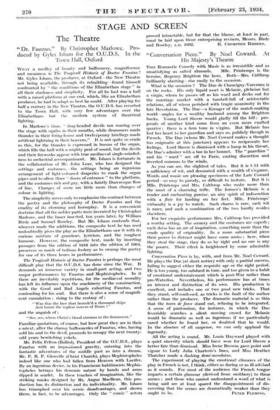STAGE AND SCREEN The Theatre
"Dr. Faustus." By Christopher Marlowe. Pro- duced by Gyles Isham for, the O.U.D.S. In the Town Hall, Oxford WHAT a medley of beauty and buffoonery, magnificence and meanness is The Tragicall Historie of Doctor Faustus ! Mr. Gyles Isham, the producer, at Oxford—the New Theatre not being available, through its rebuilding-found himself confronted by." the conditions of the'Elizabethan stage" in all their starkness and simplicity. -For all he had was a hall with a raised platform at one end, which, like an Elizabethan producer, he had to adapt as best he could. After playing for half a century in the New Theatre, the O.U.D.S. has reverted to the Town Hall, with very few advantages over the Elizabethans but the modern system of theatrical lighting.
In Marlowe's time, " sling-headed devils ran roaring over the stage with squibs in their mouths, while drummers made thunder in their tiring-house and twelvepenny hirelings made artificial lightning in their heavens." It is not quite so crude as this, for the thunder is expressed in booms of the organ, which fills the hall with a mighty peal of sound, but the devils and their fireworks appear with true mediaeval single-minded- ness to orchestral accompaniment. Mr. Isham is fortunate in the collaboration of Mr. John Lear, who has designed the settings and costumes,—the settings being an ingenious arrangement of light-coloured draperies to mask the organ pipes and to allow three " doors of entrance " to the platform, and the costumes rich and gay, with a faintly Dureresque flow of line. Changes of scene are little more than changes of colour in lighting.
The simplicity serves only to emphasize the contrast between the poetry and the philosophy of Doctor Faustus and the crudity of its clowning and horseplay. It is a convenient doctrine that all the nobler parts were invented by Christopher Marlowe, and the baser inserted, ten years later, by William Birde and Samuel Rowley. But Mr. Isham contends that, whoever made the additions, the composite text he has used undoubtedly gives the play as the Elizabethans saw it with its curious mixture of grandeur, lyricism, and the roughest humour. However, the composite text, made by inserting passages from the edition of 1616 into the edition of 1604, preserves so much of tedious foolery as to swamp the poetry for one of its three hours in performance.
The Tragicall Historie of Doctor Faustus is perhaps the most difficult play that the 0.1 .D.S. has done since the War. It demands an immense variety in small-part acting, and two major performances by Faustus and Mephistopheles. In it there are inevitably repetitions, for the mediaeval morality has left its influence upon the machinery of the construction, with the Good and Bad Angels exhorting Faustus, and contending for his soul. But there is also a sense of magnifi- cent cumulation : rising to the ecstasy of :
" Was this the face that launch'd a thousand ships
And burnt the topless towers of Ilium ?"
and the anguish of : " See, see, where Christ's blood streams in the firmament."
Familiar quotations, of course, but how great they are in their context, after the clumsy buffooneries of Faustus, who, having sold his soul to the devil, proceeds to occupy the next twenty- odd years bewitching yokels.
Mr. Felix Felton (Balliol), President of the O.U.D.S., plays Faustus with an impassioned gravity, entering into the fantastic adventures of the middle part as into a dream. Mr. P. B. P. Glenville (Christ Church), plays Mephistopheles indeed like one who had fallen from Heaven with Lucifer. By an ingenious device, in his Franciscan habiliments Mephis- topheles betrays his demonic nature by hands and arms dipped in scarlet. In these touches of imagination, like the striking masks designed by Mr. Angus MaeBean, this pro- duction has its distinction and its individuality. Mr. Isham has triumphed over his scenic disadvantages, and shown them, in fact; to be advantages: Only the " comic actors proved intractable, but for that the blame, at least in part, must be laid upon those enterprising revisers, Messrs. Birde
















































 Previous page
Previous page